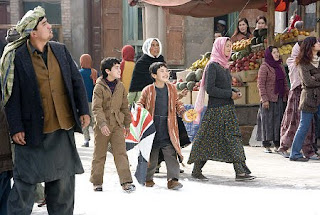tirsdag 16. november 2010
Interview of Khaled Hosseini - Part 1
Khaled Hosseini is the writer of the book The Kite Runner. Here is an interview of him talking about his master piece.
The Kite Runner - The movie
I have written about The Kite Runner in several posts. I’ve told my opinion about the book, and the book compared to the movie. Still, I don’t think the film has been presented the way it deserves. Since I loved the book, I don’t think the film reached the same level. Still, the film is worth seeing.
The film is based on historical facts, but is mostly about being human in an environment that is constantly changing. It also reflects the issues being a child in an area were conflicts affect their lives daily.
The film doesn’t contain all the scenes from the book, and a lot of details are excluded. Still, the film manages to present the action in a decorous and captivating way.
The film is based on historical facts, but is mostly about being human in an environment that is constantly changing. It also reflects the issues being a child in an area were conflicts affect their lives daily.
The film doesn’t contain all the scenes from the book, and a lot of details are excluded. Still, the film manages to present the action in a decorous and captivating way.
The Kite Runner - Book VS Film

The Kite Runner, a novel written by Khaled Hosseini became an international bestseller. The book is divided into three parts, the main character Amir’s childhood, Amir’s life as an adult and the journey back to Afghanistan to save the son of Hassan. The Kite Runner has been published in over 40 countries, and in 2007 it was adapted into a movie.
I am going to write about the conflict between Amir and Hassan, and how it compared in the movie and the book.
In the book, it says;
“I lifted Hassan’s mattress and planted my new watch and a handful of Afghani bills under it. I waited another thirty minutes. Then I knocked on Baba’s door and told what I hoped would be the last in a long line of shameful lies.”
The entire situation starts at the kite competition, when Amir wins the local tournament. He manages to cut the line of the last kite, and Hassan runs to find it for him. Hassan always finds the kites, and this time it lands in an alley. After a while, Amir starts wondering where Hassan is. He looks for him in the streets, and can finally hear some well-known voices. It’s Hassan, but also Assef and his gang, a group of boys who dislike Amir and Hassan. Because he is afraid, Amir decides to hide behind a wall of stone, close enough to see everything that is happening. Assef and his boys demand Hassan to give them the kite. He refuses because it is for Amir, and they decide to punish him. It ends with the boys raping Hassan, while Amir is watching. He is too afraid to do anything, and returns home full of shame.
This episode destroys Amir and Hassan’s friendship. They don’t spend time together as they used to. Hassan goes to bed after he has done his chores, and Amir stays out of his way. Amir doesn’t tell his father, Baba about the episode because of the fear of his reactions. He can’t handle having Hassan and his father as their servants any longer, and therefore decides to place the watch under Hassan’s mattress. Baba confronts Hassan with the episode, and Hassan says he did it even though it was a lie. Baba forgives him, but Ali feels ashamed. Ali and Hassan decide to leave, and Ali never sees Hassan again.
The conflict between Amir and Hassan is quite similar in the film compared to the book. Still, the book made a greater impression on me. Khaled Hosseini describes the rape of Hassan and the consequences of Amir’s actions, in a brutal but also apprehending way. The film doesn’t give me the same feelings I get while reading the book.
The film got a lot of positive reviews, but it’s nothing compared to the book. The Kite Runner is a book worth reading. It is an unforgettable story about friendship, betrayal and price of loyalty described in an interesting and apprehending way.
Photo from this site
Abonner på:
Kommentarer (Atom)